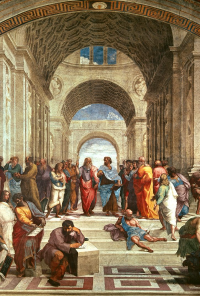The Governance
“Governance,” Aristotle continued, “can take one of three primary forms: democracy, aristocracy, and monarchy. There are advantages and disadvantages to all three forms. Democracy is the fairest in theory, but if the majority of voters are more vicious than they are virtuous, then democracy cannabilizes itself. On the other extreme, we have monarchy, which - in theory - could be supremely more efficient than democracy, provided that the one individual, with total power, is the most virtuous and least vicious person for that job. As a mean, we have aristocracy, whereby the king and the people alike bestow a considerable sum of their power and trust upon a select, elite group of individuals. Of course, if said group is more vicious than virtuous, then society is dealt an equal degree of injustice. These three forms considered, the question at hand then concerns which of the three would be most conducive toward eliminating all crime on Earth.”
Alexander stood. “Monarchy is ideal but equally unrealistic. From what Musk has shared with us, Earth in the year 2019 AD is dominated by aristocratic rule, but, correct me if I am mistaken, teacher, but would its perversion not be denominated by ‘oligarchy,’ and, given the state of affairs, would it be safe to conclude that this form of governance is not suitable, either?”
“I would not disagree with your reasoning,” replied Aristotle.
“Then I cannot help but infer that democracy is our only hope.”
“Democracy is a possibility,” said Socrates, “but provided, and only provided, that education ensures every voting party is wise, just, and hence competent, to engage in the democratic process.”
Everyone at the table seemed to agree.
After a long pause, Plato stated, “Perhaps, then, in summary, we can agree upon democracy and education as key ingredients. But how do we achieve such an end?”
“Again. Technology,” cackled Musk.
